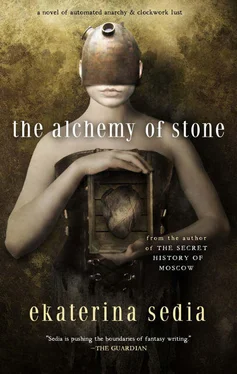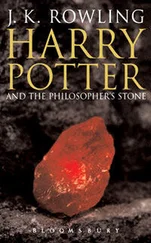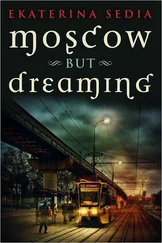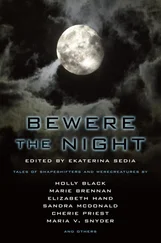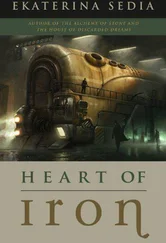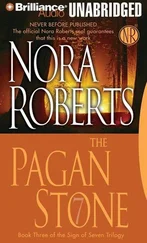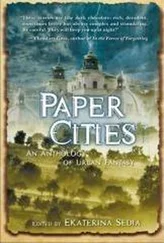She led Mattie to a large cavern where water stood ankle-deep and dripped down along the walls, through tiny channels shaped over many years. There were human voices there too, and clanging of metal, and the acrid smell of smoke. As they moved carefully, their feet uncertain on the silty slippery floor, something big started to take shape in the darkness, and Mattie gasped the moment she discerned the true dimensions of the contraption.
It was as tall as two men, broad and squat, furnished with a multitude of jointed legs, like a giant crab. The rivets of the creature’s carapace were mismatched, some dull and gray, others shining copper. In the center of the machine there was a small tower, and through its glass Mattie saw a man within. The contraption groaned and shuddered, and the gears ground heavily within it.
“What is it?” Mattie said.
“A weapon,” Niobe answered. “Sebastian built it—others helped, of course. I suspect that this is why miners tolerated our presence. They don’t like the mechanics or the machines, but if any can be used to their advantage…”
Mattie circumvented the machine and found herself staring down the barrel of a short and broad cannon. She had no doubt that the contraption would be a fitting match for the mechanics’ barricades on the surface as well as the enforcers’ muskets.
“Impressed?” Niobe asked.
Mattie nodded wordlessly. She was impressed although perhaps not in the way her friend meant. Along with her fear at the machine’s formidable proportions and its obvious destructive capabilities, Mattie felt relief—there was a finality about the thing, sitting so calmly and yet boiling and shuddering with the hidden workings of its mechanism. It would be capable of ending the fighting, and it would be capable of overcoming the city’s resistance. Mattie was ashamed to realize that she did not truly care who won—all she wanted was for this to end, so she could go home and resume the making of her unguents, not before getting her key of course, but otherwise she wanted things to go back to the way they were. And it didn’t really matter who was governing the city—as long as they kept building such machines, people would bleed, and there would be work for an alchemist. Mattie proudly thought that she was a good one—after all, she was the one to free the gargoyles from their bondage, the only one to accomplish such a difficult task among those who had tried. And that had to count for something.
The surface world assaulted Mattie with bright light and acrid smoke. She emerged from the newly blasted exit, climbing awkwardly up a ladder improvised from bits of scaffolding, following Niobe, Iolanda close behind. Mattie hoped that by now the fighting would be over, and she would have to witness just the consequences but not the actual bloodshed. She was surrounded by people—mostly the courtiers, but Niobe and a few miners remained nearby, reassuring.
“The city is ours now,” one of the miners said.
“Not quite,” the light-haired courtier answered. “We still need the fighting to cease and power to be transferred in an orderly fashion. We need the mechanics to formally surrender. Otherwise, the resistance will fester.”
They walked through the streets, silent and empty at the moment. There were no dead bodies and no lizards, but a low cloud of ash hung over the city, and the air smelled of gunpowder. A thin layer of dust seemed to have settled over everything—the cobbled pavements, the awnings of the still-standing buildings, the twisted remains of the abandoned caterpillars stacked in the streets.
The rumor was, the fighting was continuing by the western district still, where the enforcers and the mechanics occupied a defensive position between the Grackle Pond and the paper mill, barricaded by caterpillars and what remained of the Calculator. Mattie could appreciate the defensive quality of so much metal, and she was apprehensive when they turned west.
Iolanda carried the jar with the homunculus—she fed it well, and the creature swelled with blood, barely fitting into its jar. Iolanda frowned, worried. “I wonder if my influence will last enough time to have him do what he must.”
“Let you into the Parliament, you mean,” Mattie said. “You could’ve used explosives.”
Iolanda shook her head. “Too many valuable documents in there,” she said. “Besides, if we want people to turn to our side, we will have to take the seat of legitimate power, not destroy it.”
Mattie suspected that Iolanda was not exactly lying, but simply not telling the whole truth. The rebels wanted the support of the ruling party, however fleeting and limited. Legitimizing one in the eyes of the populace was a familiar concern—the mechanics always talked about it at their meetings, as did the alchemists, but usually such talks happened before the election. Mattie was surprised to learn that a violent overthrow was not free of such considerations either.
They did not dare to approach the Grackle Pond, where musket shots resonated among the gutted buildings, abandoned by their wealthy owners. Mattie thought that everyone who was able to had moved on by now, and only the poor and the stubborn remained behind. This is why it was so quiet— what few people still remained in the city were not venturing into the streets without acute necessity. The winners would have an empty, mutilated city to govern, and Mattie could not imagine why anyone would want that.
They stopped in the street not far from the pond, and Iolanda crouched down and shook the homunculus out of its vitreous prison. It landed on a pavement with a wet thwack, and stood on its soft boneless legs and burbled. “Go,” Iolanda commanded. “Go and bring him to me.”
The homunculus departed toward the sound of the shots and the hulking gray structure standing in the distance, on the far shore of the pond, the outlines of which Mattie could not quite make out due to dust and smoke in the air. She only tasted warm metal and tired flesh, gunpowder and crumbling stone. “What do we do now?” she asked Iolanda.
“We wait for your master,” Iolanda answered. “Our troops were instructed to let him pass through unharmed.”
The people settled on the steps of the buildings and on the pavement. As much as Mattie missed the habitual bustle of the city, she only wished to see Loharri for the last time, to get her key, and to go home. She pictured in her mind her small apartment nestled under the roof that got so hot in the summer. She missed the long bench with all of her painstakingly collected equipment, and she worried that the sheep’s eyes, pickled as they were, would go bad in the heat. She missed the constant slamming of the door in the apothecary downstairs, the squeaking of the steps announcing a client. She missed having no other concerns but missing a deadline on a potion for an important client, or hunting down an obscure recipe. There was simplicity in her life as it used to be, and she longed for its return.
We watch the spiders as they crawl through the streets, endlessly fascinating and pitiful. We follow them, trying to reconcile the vision of the children as they used to be with the deformed creatures down below, sifting through the piles of garbage and dead bodies. With most of the automatons destroyed, they took on their jobs—sorting and cleaning, collecting what could be saved and piling the rest into heaps and burning it. Fires smolder low, bringing with them a surprising, gentle reminder of autumnal leaves and bitter fall air.
We fear that they will be forgotten and cast aside soon— they are not as useful as the able-bodied men with dark faces and pale eyes who came from the mines, their stained clothes overlaying bulging shoulders and thick arms. We fear that the spiders will forever sift through refuse, unable to do much else, and we resolve to protect them as much as we can.
Читать дальше
